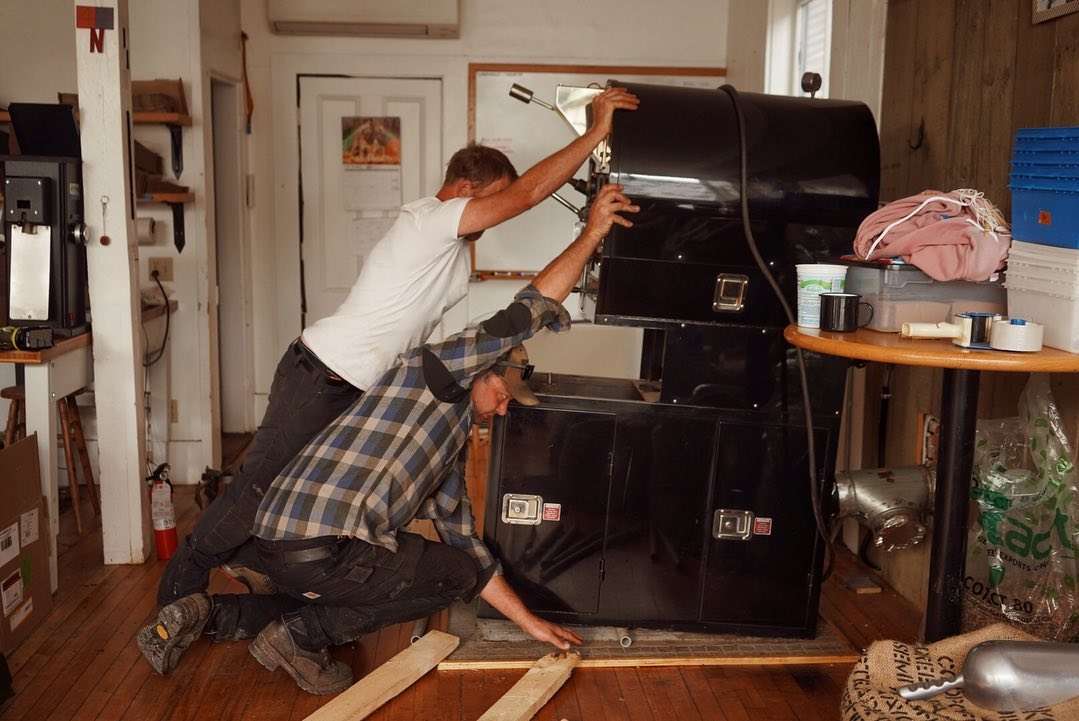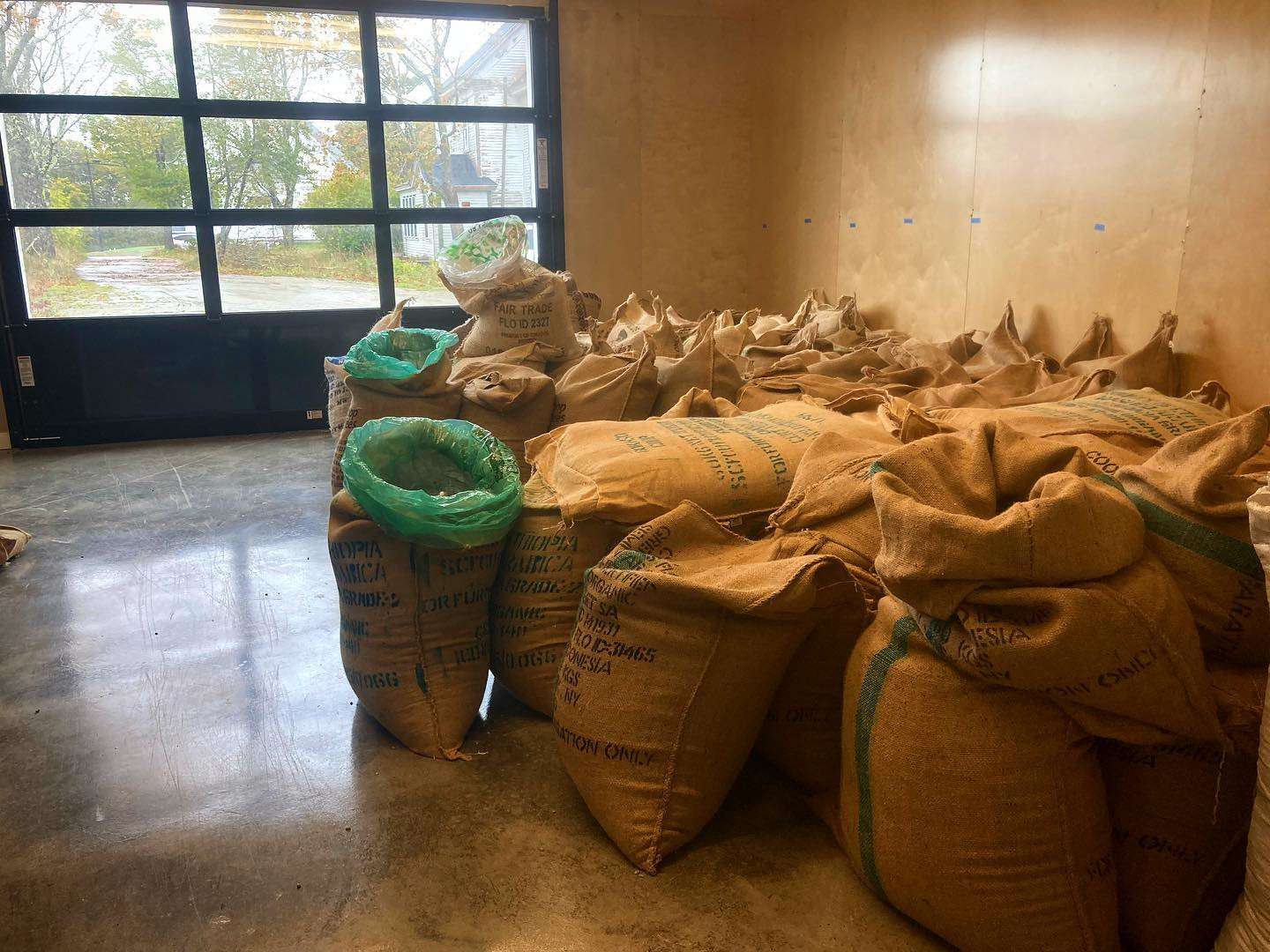
Deer Isle coffee company expands with dedicated roastery
 Courtesy / 44 North Coffee
From left, Megan Dewey-Wood and Melissa Raftery are growing their Deer Isle company, 44 North Coffee, with the addition of a purpose-designed roastery.
Courtesy / 44 North Coffee
From left, Megan Dewey-Wood and Melissa Raftery are growing their Deer Isle company, 44 North Coffee, with the addition of a purpose-designed roastery.
With its latest expansion into a dedicated roasting facility, 44 North Coffee on Deer Isle is looking to expand its wholesale segment as well as meet its growing web and retail needs.
“The new roastery will allow us to grow our wholesale as well as web and retail production,” co-founders Melissa Raftery and Megan Dewey-Wood told Mainebiz in a joint email.
44 North Coffee is named after the latitude of the company's first facility, a combined roastery and coffee shop on the second floor of an old Deer Isle school house called Seamark.
The company, founded in 2010 and certified organic by the Maine Organic Farmers and Gardeners Association, roasts 100% Arabica coffee beans. The co-owners buy green, unroasted beans through a fair trade importer, Americus, Ga.-based Cooperative Coffees.

44 North became full-fledged members of Cooperative Coffees in 2018, allowing it to serve on committees, have a voice through participation, and a vote.
Dewey-Wood is a Deer Isle native. Raftery, who is from Cincinnati, moved to Maine to be a whitewater rafting guide. They each were ordering beans from around the United States for their own use when they realized they had a potential business.
Today, the company operates a year-round facility at 7 Main St. on Deer Isle and a seasonal coffee shop at 70 Main St. in Stonington.
“44 North Coffee started with one bag of unroasted green coffee and two business partners in a very cold building,” the partners said.
Today, the company has six year-round employees in the Deer Isle village cafe, and expands to about 10 employees to run the seasonal cafe in Stonington.
It’s also grown from strictly roasting and selling coffee to a full line of merchandise and brewing equipment, as well as pastries from several local bakers.
New roastery
Earlier this year, the partners acquired 56 Church St. in Deer Isle for its roastery, with an eye toward holding it for the long term. The acquisition is designed to meet the company’s need for more space.

“The one story building is architect-designed and an ergonomic production space that will allow us to employ more year-round employees,” they wrote. “The new roastery is still located in Deer Isle village, which allows for close access to deliver product to our cafe on Main Street and also the post office to drop off daily web packages. Our primary interest is investment in the Deer Isle community and economy, so we are very fortunate that our production space did not have to be located off island.”
The structure was solid but had significant wear. The partners received a loan from the Eastern Maine Development Corp. and hired a contractor who took the building down to the studs, replaced the concrete slab and rebuilt the space with tighter windows, radiant heat, double garage doors and more amenities.
Now that the company’s roastery production has moved into the dedicated space, the partners are working on redesigning their cafe at 7 Main St., with the goal of expanding product offerings and lengthening the customer season. The 7 Main St. redesign is expected to be complete by summer 2022.
Artisanal roasting
The new roastery space is 2,000 square feet, compared with 300 square feet that was allocated to roasting operations at 7 Main St., Dewey-Wood told Mainebiz in a separate phone interview.
In 2020, the company shipped 50,000 pounds of roasted beans, a figure that’s been trending up at least 10% per year.
Beans are roasted in small batches of 20 to 22 pounds. That adds up to 500 pounds per day at times.
“We do that manually,” she said. “We’re smelling it, we’re tasting it, we’re adjusting the roast minute by minute. So it’s not a ‘set it and forget it’ system. The way we approach making coffee is more of a craft.”
Bean shipments primarily go to Maine-based customers.
“For wholesale, we try to keep it relatively close,” she said. “We have a couple of out-of-state accounts.”
Direct-to-consumer sales through the company’s website ship throughout the country daily. Web sales have grown almost exponentially over the past year.
The new roastery was financed partially through savings from cash flow and partially through a loan.
The company has nine year-round employees, up from five in 2020.
“As we expand and get our second roaster, we’ll probably need two to three more year-round,” she said.
Finding employees in the small village can be a big challenge.
“But we’ve been really fortunate,” she said. “We’ve had employees with us almost seven years now. Most of them grew up on the island. Several are going to college remotely — a couple of them are going to business school remotely.”
The biggest challenge, seasonally, is finding housing for employees. This past summer, one came from the Midwest specifically to work for the artisanal business, but had to commute 45 minutes from Airbnbs around the peninsula.
“We feel like we offer a competitive starting wage and perks and a positive working space that, by reputation, people come to us looking for work,” she said.
Pandemic challenges
The activities come as the partners have navigated challenges over the past year.
“The pandemic has affected every part of our business in hard ways and a few good ones, too,” they wrote.
That included supply chain issues around importing coffee, which became particularly noticeable in June in both global and local freight delays. Over the summer, the company had to source paper cups for its cafes through Amazon on an “as needed” emergency basis when supply distributors weren’t able to fulfill orders.
“We had to shut our cafe to the public and change to a phone-in/curbside service for over a year,” they wrote.
On the positive side, they saw an increase in web sales because many people were ordering coffee as they transitioned to working from home.
“We would like to believe that customers tried to support their local small businesses even more as they didn't want to see them fail,” they wrote. “The best part of this whole rollercoaster process has been working with a team that evolved and pivoted with us, a team that showed up every day — either in person or working from home — and continued to make 44 North thrive this past year.”
Mainebiz web partners
This coffee RULES! It's some of the best my wife has ever had (We've done the subscription a few times for her so far), Good luck










1 Comments